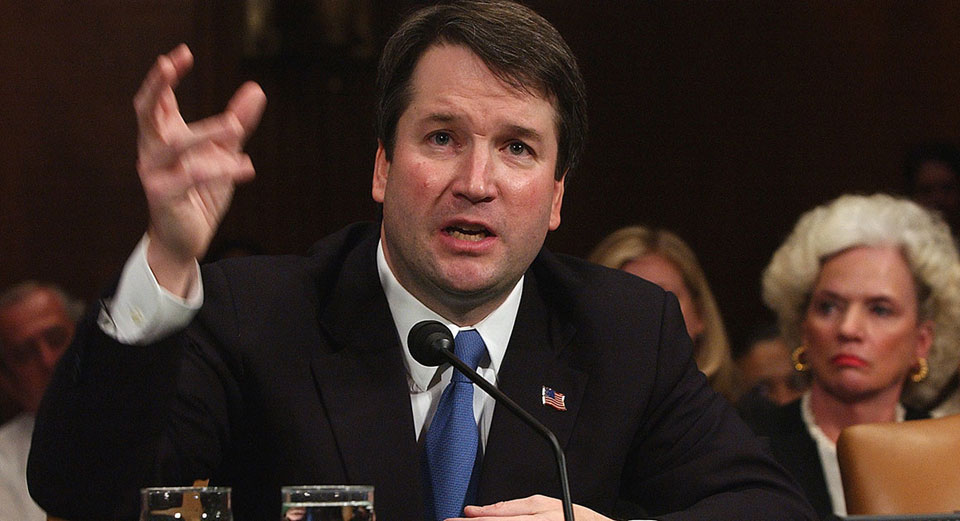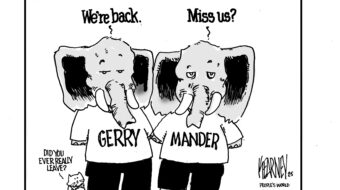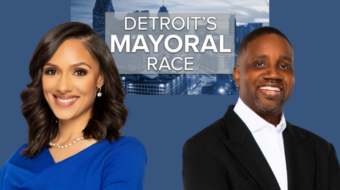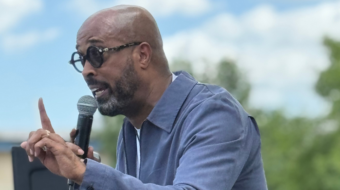
While attention focuses on the fight over GOP President Donald Trump’s nomination of Brett Kavanaugh to the U.S. Supreme Court, the reality for workers nationwide is that federal appeals courts often determine their fate, instead.
As a matter of fact, Kavanaugh, who was a Republican political hack for George W. Bush, illustrates that. His 12-year record on the U.S. Circuit Court of Appeals for the District of Columbia – the court that handles most labor-law cases – is consistently anti-worker.
That’s led the AFL-CIO and other unions, and workers nationwide, to oppose right-winger Kavanaugh’s bid to replace the High Court’s “swing vote,” Justice Anthony Kennedy. It’s also shown the importance of the 12 federal appeals courts, and their rulings, to workers.
Lawyers will tell you appellate court rulings, almost all from 3-judge panels, govern cases only in states those particular courts cover. That’s both literally true but also, in practical terms, understating the case (pardon the pun). That’s because both judges and lawyers cite other appeals courts’ rulings when making arguments or writing decisions.
One outstanding example: The Chamber of Commerce got a federal judge in rural red-state Texas to issue a nationwide court order to kill the Labor Department’s “fiduciary rule.” The Obama administration rule ordered financial advisers to workers and pension funds to put their clients’ interests first, ahead of their own.
On March 15, Judge Edith Jones of the Fifth U.S. Circuit Court of Appeals in New Orleans upheld the court order. The fiduciary rule, designed to rein in corporate crooks who take advantage of workers and pensioners, is dead nationwide – though that important case never reached the Supreme Court. Many other recent appellate rulings have gone against workers:
Can a union sue because a government visa program lets more foreign visa holders compete for jobs? The answer, from D.C. Circuit Judge Karen Henderson to Wash Tech, a Communications Workers local working to organize high-tech workers, is “yes.”
The government issues F-1 student visas for foreign students, and it lets the students stay and work here for three years after they graduate. WashTech argued the Obama administration’s 2016 decision to almost double such “optional practical training” visa-holders, to 92,000, for science, technology, engineering and math grads, deprived its members of job opportunities. Lower courts dismissed WashTech’s suit, saying the union itself wasn’t hurt. On June 8, Henderson revived it. She said the decline in job opportunities hurts its members.
Norwegian Air International can fly around the U.S. Norwegian is hiring flight crews in Singapore, using the lax labor rules from its Irish charter to low-pay them, and generally undercutting U.S. airlines, especially on Trans-Atlantic routes. NAI also wants to fly all around the U.S. It asked the Obama administration for a permit to do so, and transportation unions opposed that. They said the “flag of convenience” NAI would do to airline workers what “flag of convenience” shipping firms did to the higher-standard well-regulated U.S. maritime industry: Wreck it. But Obama’s Transportation Secretary OK’d NAI’s permit.
Three pilots unions and the Association of Flight Attendants-CWA sued current Trump Transportation Secretary Elaine Chao in the D.C. Court to overturn the permit, arguing NAI’s “business model and labor practices are not in the public interest.” Judge David Tatel, writing for the panel, let them sue Chao, and then ruled against the unions. He said, despite international air treaties governing U.S.-Europe traffic, including treaty provisions on pay and working conditions, that NAI satisfied DOT’s requirements for a permit.
Did a theatrical union steer job opportunities to workers at a firm it was trying to organize – and is that legal? Yes, it did, and the National Labor Relations Board must hold “an evidentiary hearing” to find the facts and rule if that’s legal, the Seventh U.S. Circuit Court of Appeals panel in Chicago ruled in June.
Theatrical and Stage Employees Local 2 was conducting an organizing drive among stagehands at Chicago-based Jam Productions in late 2015, Judge Ilana Rovner explained. As part of it, IATSE made sure Jam workers got jobs when slots opened up at union-covered area theaters, Jam alleged. That could skew the unionization vote, the company charged.
The union won the Oct. 4, 2015 vote 22-10, but there were 13 challenged ballots, five from IATSE and eight from Jam. The problem, Jam said, was that Local 2 made sure part-timers at Jam’s “Shaw Crew” got better-paying jobs in their “downtime” at other IATSE-represented theaters. The company said that’s illegal.
The board backed Local 2; Rovner and the other judges didn’t. “Although the standard of (judicial) review is deferential” to the NLRB’s expertise, “we believe Jam presented enough evidence to obtain an evidentiary hearing and the board abused its discretion by refusing to hold one,” they said. And offering potential higher-paying jobs to potential voters “could plausibly be seen as an inducement” to vote for Local 2, and that’s illegal, they added.
A notable “gig economy” case hits the courts – and workers lose, at least for now. On May 11, the Ninth U.S. Circuit Court of Appeals threw out Seattle’s ordinance allowing drivers for Lyft, Uber and other ride-sharing services to unionize. The Teamsters had been conducting successful organizing drives among the drivers, whom the ride-share firms called “independent contractors” and thus barred from unionizing. The Chamber of Commerce – not the city – challenged the ordinance.
Appellate Judge Milan Smith’s decision left one question unanswered: Did the Seattle ordinance break labor law? Smith’s panel ruled Seattle’s ordinance broke the Sherman Antitrust Act because Washington state had to OK the idea first, and didn’t. But “the panel affirmed the district court’s dismissal of claims the ordinance was pre-empted” – i.e. outlawed – “by the National Labor Relations Act,” Smith wrote. The key word is “dismissal.” The judges sent that part of the case back down to the lower court for trial.
You can’t discipline a fast-food worker for a one day strike just because you didn’t receive the official announcement. LeReda Hayes, manager at the Burger King on East 47th Street in Kansas City, Mo., tried that against workers Osmara Ortiz, Susan de la Cruz Camilo and West Humbert for participating in Fight for 15 and a Union’s one-day strike in mid-April 2015.
Hayes claimed she never got the written notice the three were striking. The judges of the Eighth U.S. Circuit Court of Appeals in St. Louis noted, three years later, that Hayes knew the three were union activists, that the strike was publicized – and that Ortiz had participated in another one-day strike at another fast food restaurant Hayes had managed. Given all that, the NLRB ruled for Ortiz specifically and so did the judges. They said Hayes illegally disciplined Ortiz for taking collective action to protect her rights as a worker.
After a takeover, you can’t hire a bunch of part-timers and throw them into the bargaining unit in order to claim the union doesn’t represent most workers. That’s what Publi-Inversiones de Puerto Rico tried to do at El Vocero after it bought the newspaper at a bankruptcy sale. The News Guild-CWA’s Local 33225 represented the paper’s 100 workers and PI rehired 24 of them, out of 36 bargaining unit positions available.
The local said PI is a “successor employer” that must pick up the contract and bargain with the union. PI said it isn’t, because it also hired 51 part-time low-paid no-benefit “inserters” to put plastic-wrapped supplements into El Vocero and so the union doesn’t represent a majority anymore. The NLRB agreed with the union, noting PI must bargain with “an (their emphasis) appropriate bargaining unit.” The rehired workers were an appropriate unit, NLRB said. So did the judges. “In a successorship case, as in any representation case, a historical unit” – the local had represented El Vocero’s workers since 1975 – “can be rejected only if it is ‘truly inappropriate,’” Judge Laurence Silberman wrote.
Courts force workers into mandatory arbitration. In early June, the Supreme Court – by the usual 5-4 majority with all five GOP-named justices voting against workers – said firms can force workers into mandatory one-on-one arbitration of job complaints, despite labor law. It barred workers from banding together in class action suits over those issues. Statistics show workers lose arbitrations to bosses more than 90 percent of the time.
Following that decision, the appeals courts started enforcing it and workers are losing. The 11th U.S. Circuit Court of Appeals in Atlanta was among the first. On June 26, it threw out former Cowabunga Pizza delivery driver Chadwick Hanes’ class action suit against the Savannah-based firm for paying him – and other drivers – below the minimum wage because it shorted him and the others on car expenses for delivering pizza. The NLRB ruled for Hanes, but the new Trump-named NLRB majority there reversed course.
The appeals judges, citing the High Court’s decision, ruled for Cowabunga. Ironically, the case took so long – it began in 2015 – that both sides agreed to collective arbitration beforehand. In an upset, the arbitrator ruled for Hines and 563 other drivers.
The same day, the same appeals court ruled against the NLRB’s and former Everglades College counselor Lisa Fikki’s suit against the college for forcing her to sign a similar forced arbitration agreement. She wanted more time to review it with her lawyer. The lawyer was unavailable by the college’s deadline, so Everglades fired her. The NLRB sided with Fikki, the for-profit college sued, the judges sided with the college – and with forced arbitration – and Fikki is now out of a job.
Unpaid pension plan contributions aren’t collectible “plan assets.” Ninth U.S. Circuit Court of Appeals Judge Michelle Friedland said so in a March decision involving almost a dozen Painters pension funds, Accuracy Glass & Mirror Co., of Nevada, and its two owners, who were also pension trustees. Pension plan language between the unions and the firm said unpaid contributions were plan assets.
But Friedland, in San Francisco, relied on a similar three-year-old case from the First U.S. Circuit Court of Appeals in Boston. That court also ruled for the firm and its trustees and against the unions seeking unpaid pension plan contributions, and the Supreme Court upheld that decision, without comment.










